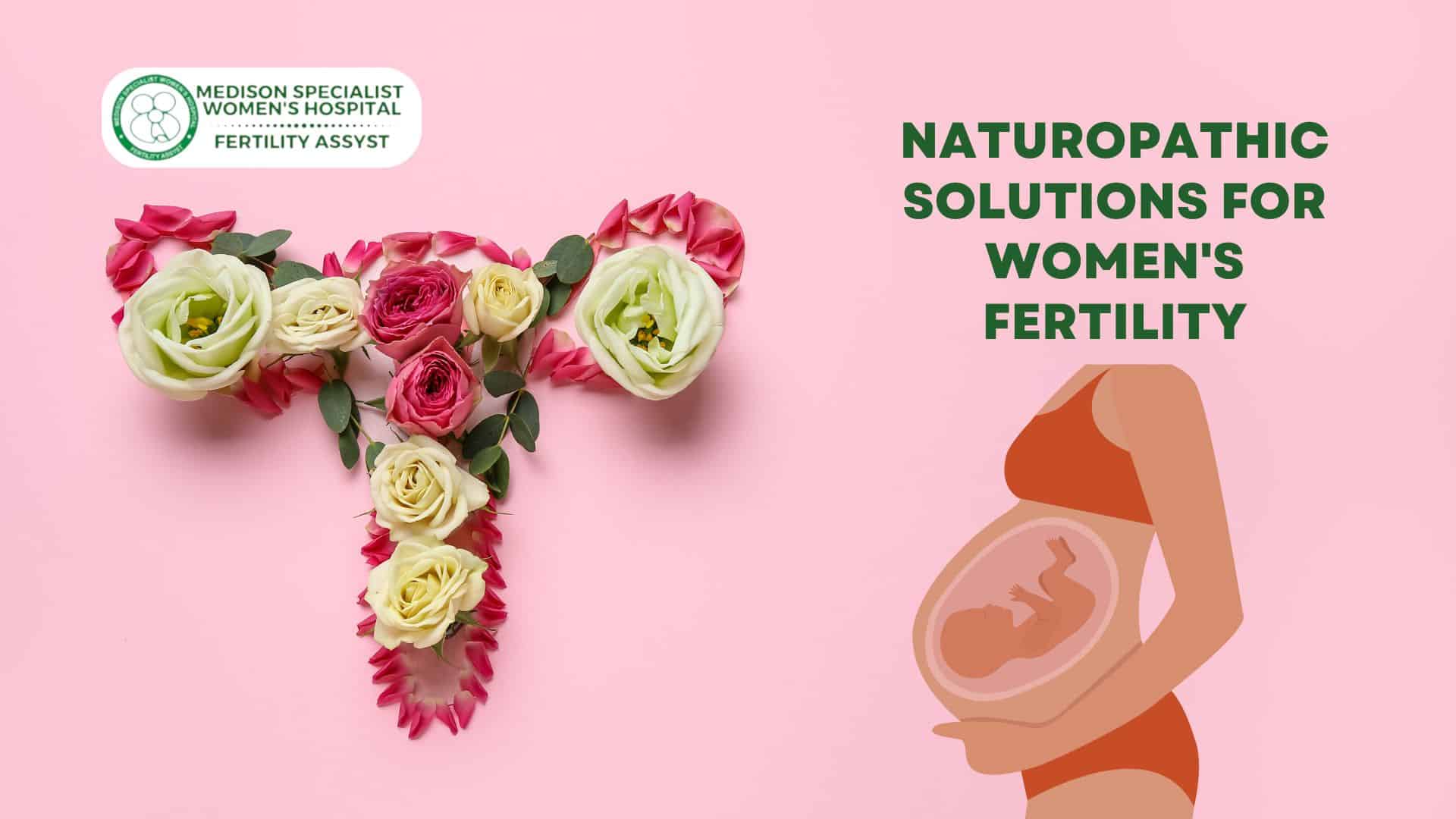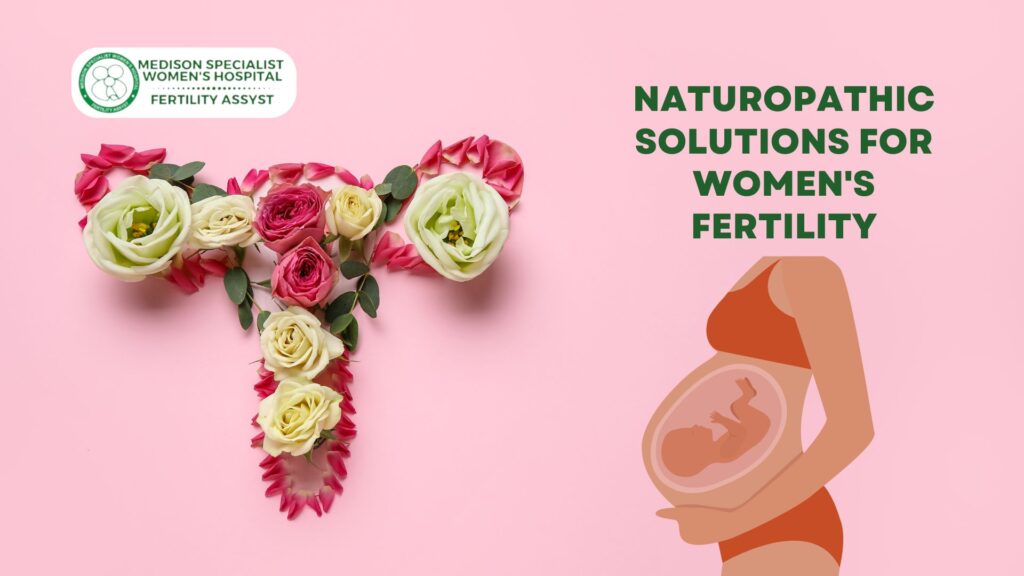Naturopathic Solutions for Women’s Fertility
Fertility challenges can be a deeply personal and stressful journey for many women. While modern medicine offers a variety of solutions, some women seek more natural approaches to enhance their fertility. Naturopathic solutions, which emphasize natural remedies and holistic care, provide a viable alternative or complement to conventional treatments. This blog explores various naturopathic strategies for boosting women’s fertility, including diet, lifestyle changes, herbal remedies, acupuncture, and stress management.

Understanding Women’s Fertility The Female Reproductive System
To understand how naturopathic solutions can aid fertility, it’s crucial to have a basic understanding of the female reproductive system. The main components include:
- Ovaries: Produce eggs and hormones like estrogen and progesterone.
- Fallopian Tubes: Transport eggs from the ovaries to the uterus.
- Uterus: The site for implantation and fetal development.
- Cervix and Vagina: Facilitate sperm entry and protect the internal reproductive organs.
Factors Affecting Fertility
Several factors can impact a woman’s fertility, including:
- Age: Fertility declines with age, especially after 35.
- Hormonal Imbalances: Conditions like PCOS and thyroid disorders can disrupt ovulation.
- Lifestyle Choices: Smoking, excessive alcohol consumption, and poor diet negatively affect fertility.
- Stress: High-stress levels can interfere with hormonal balance.
- Environmental Toxins: Exposure to certain chemicals can impair reproductive health.
Diet and Nutrition
Nutrient-Rich Diet
A balanced, nutrient-rich diet is fundamental to enhancing fertility. Key dietary components include:
- Fruits and Vegetables: Rich in antioxidants that protect eggs and sperm from damage.
- Whole Grains: Provide essential B vitamins that support hormone production.
- Healthy Fats: Omega-3 fatty acids in fish and flaxseed are crucial for hormone regulation.
- Protein: Lean meats, beans, and legumes support overall health and reproductive function.
Specific Nutrients for Fertility
Certain nutrients are particularly beneficial for fertility:
- Folic Acid: Vital for DNA synthesis and cell division. It is found in leafy greens, beans, and fortified cereals.
- Iron: Important for ovulation and found in red meat, spinach, and lentils.
- Vitamin D: Supports hormone regulation and can be obtained from sunlight, fatty fish, and fortified dairy products.
- Coenzyme Q10: An antioxidant that improves egg quality, available in organ meats, spinach, and supplements.
Lifestyle Modifications Exercise
Regular physical activity is beneficial for maintaining a healthy weight and reducing stress, both of which are important for fertility. However, moderation is key; excessive exercise can disrupt hormonal balance.
Avoiding Harmful Substances
- Smoking: Damages eggs and accelerates ovarian aging.
- Alcohol: Excessive consumption can interfere with hormone levels.
- Caffeine: High intake may negatively affect fertility; moderation is recommended.
Sleep
Adequate sleep is essential for hormonal balance and overall health. Aim for 7-8 hours of quality sleep per night.
Herbal Remedies Vitex (Chaste Tree Berry)
Vitex agnus-castus is a popular herb that balances hormones and regulates menstrual cycles. It can be particularly helpful for women with irregular periods or luteal phase defects.
Maca Root
Maca root, native to Peru, is known for its ability to boost energy, libido, and hormonal balance. It can help regulate menstrual cycles and improve ovulation.
Red Clover
Rich in phytoestrogens, red clover can help balance estrogen levels and improve cervical mucus, making it easier for sperm to reach the egg.
Evening Primrose Oil
Evening primrose oil is high in gamma-linolenic acid (GLA), which can enhance cervical mucus production and improve uterine function.
Acupuncture and Traditional Chinese Medicine (TCM) Acupuncture
Acupuncture involves inserting thin needles into specific points on the body to stimulate energy flow and restore balance. It has been shown to improve blood flow to the reproductive organs, regulate hormones, and reduce stress.
Herbal Medicine
TCM also includes the use of herbal formulas tailored to individual needs. Common herbs used in TCM for fertility include:
- Dang Gui (Angelica Sinensis): Enhances blood flow to the uterus.
- Bai Shao (White Peony): Regulates menstrual cycles.
- Shu Di Huang (Rehmannia): Supports kidney health and hormonal balance.
Stress Management Mind-Body Techniques
Stress can significantly impact fertility by disrupting hormonal balance. Incorporating mind-body techniques can help manage stress and improve overall well-being.
- Meditation: Promotes relaxation and reduces anxiety.
- Yoga: Combines physical postures with breathing exercises to enhancerelaxation and improve blood flow.
- Mindfulness: Increases awareness and reduces stress by focusing on the present moment.
Support Systems
Seeking support from friends, family, or a therapist can provide emotional relief and reduce feelings of isolation during the fertility journey.
Case Studies and Success Stories Case Study 1: Hormonal Imbalance and PCOS
A 32-year-old woman with PCOS struggled with irregular cycles and anovulation. After six months of following a naturopathic regimen that included a low-glycemic diet, Vitex, and acupuncture, her cycles regulated, and she conceived naturally.
Case Study 2: Age-Related Fertility Decline
A 38-year-old woman facing age-related fertility decline sought naturopathic treatment. She incorporated a diet rich in antioxidants, started taking Coenzyme Q10, and practiced yoga regularly. Within a year, she successfully conceived.
Case Study 3: Unexplained Infertility
A couple experiencing unexplained infertility for two years decided to try naturopathic methods. The woman started acupuncture, herbal medicine, and stress management techniques. After eight months, they conceived without any conventional medical interventions.
Integrating Naturopathic and Conventional Treatments Complementary Approaches
Naturopathic treatments can complement conventional fertility treatments. For example, acupuncture can enhance the effectiveness of IVF by improving blood flow to the uterus and reducing stress.
Communication with Healthcare Providers
It is essential to communicate with healthcare providers about any naturopathic treatments being used to ensure a coordinated and safe approach.
Potential Risks and Considerations Herbal Interactions
Herbs can interact with medications, so it’s crucial to consult with a healthcare professional before starting any new supplements.
Individual Variability
Naturopathic treatments are not one-size-fits-all. Individual responses can vary, and what works for one person may not work for another.
Patience and Persistence
Natural approaches often take time to show results. Patience and persistence are key when pursuing naturopathic solutions for fertility.
Conclusion
Naturopathic solutions offer a holistic and natural approach to enhancing women’s fertility. By focusing on diet, lifestyle changes, herbal remedies, acupuncture, and stress management, women can improve their reproductive health and increase their chances of conceiving. While these methods can be highly effective, it’s important to approach them with patience and to consult with healthcare professionals to ensure safety and efficacy. Whether used alone or in conjunction with conventional treatments, naturopathic solutions provide a comprehensive strategy for women on their fertility journey.

